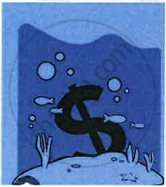Advertisements
Advertisements
Question
Distinguish between fixed and circulatory capital.
Solution
| Fixed capital | Circulatory capital |
| Fixed capital refers to those capital goods which can be used again and again in production. | In it, all those things are included which are used in production only once. |
| Example: machinery, factory building | Example: Cotton and fuel |
APPEARS IN
RELATED QUESTIONS

Identify what type of capital is it?
Is a multiple use power generating machine owned by a factory, sunk capital or floating capital? Give two arguments to support of your answer.
Match the following and select the correct option.
| Column I | Column II | ||
| (i) | Capital which is given to workers in form of wages | (A) | Circulating capital |
| (ii) | Producer goods having long life | (B) | Floating capital |
| (iii) | Goods which can be used for a specific purpose only once | (C) | Fixed capital |
| (iv) | Goods which can be put to alternative uses or by several industries | (D) | Remunerative capital |
Observe the relationship of the first pair of words and complete the second pair.
Office furniture; Fixed capital
Power of running the plant ______
______ capital is used once in production whereas ______ capital can be used for long time.
Which of the following types of capital can be used only for a specific purpose?
Explain in brief the term sunk capital.
Classify the following into fixed capital and working capital. Give reasons:
A television in a hotel room.
Classify the following into fixed capital and working capital. Give reasons:
Iron ore in steel plant.
Out of the following capital used in the cotton textile industry classify the following as fixed or circulating capital.
- Cotton yarns
- Dyes
- Power
- Weaving machines
- Factory buildings
- Machines
- Stocks of raw material lying in a factory
- A car owned by a taxi-driver
- Coal used in a factory
- Cotton used by a doctor
